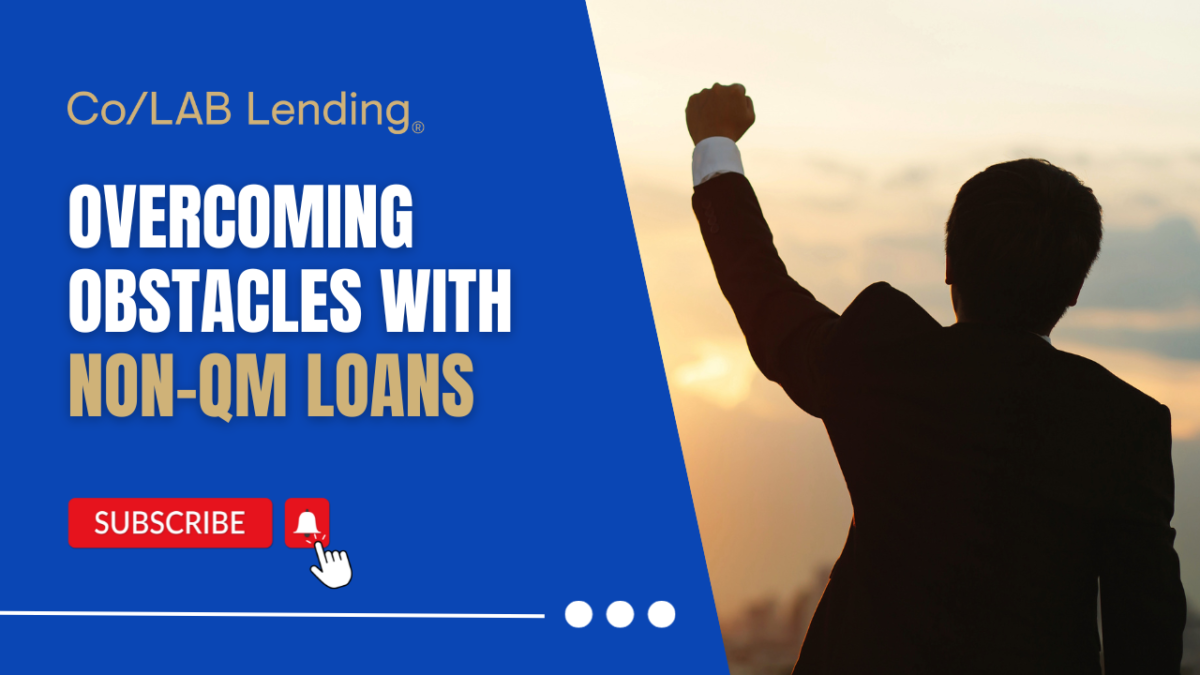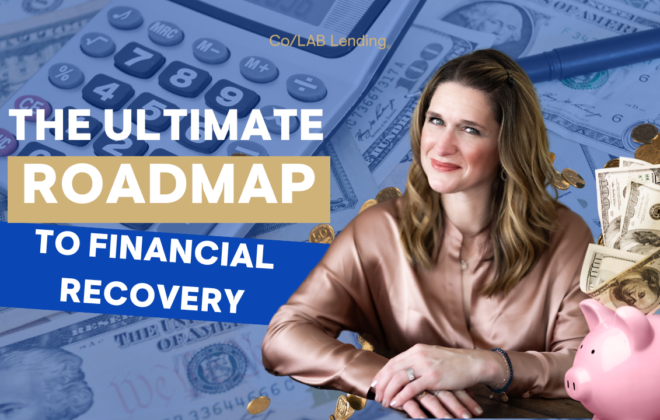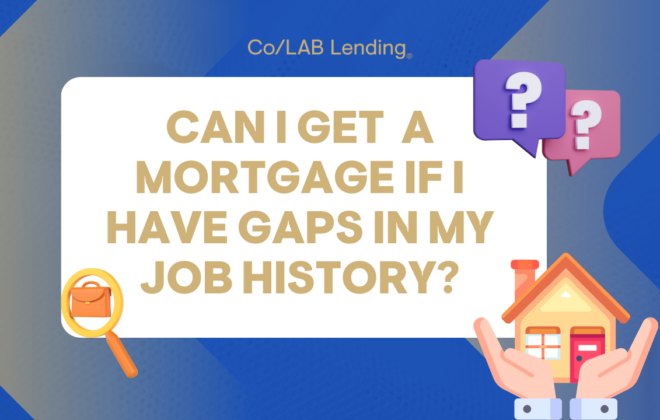A Path to Homeownership: Overcoming Obstacles with Non-QM Loans
Buying a home is a major milestone in life, but for some homebuyers it can seem like an impossible dream. Traditional mortgage lenders often have strict requirements that can be difficult for self-employed individuals, real estate investors, those with non-traditional income, or those with a unexpected credit score event to meet. Fortunately, there are non-QM loans available that can help make homeownership a reality. Non-QM loans, such as DSCR loans, ITIN loans, and bank statement loans, are designed to help those who don’t fit the traditional lending criteria. These loans are tailored to the individual’s unique financial situation, allowing them to purchase a home even if they they don’t report enough income on their tax returns or have a social security number due to citizenship. With the introduction and help of non-QM loans, homeownership is within reach for many who thought it was not a possibility.
What is a Non-QM Mortgage?
For many potential homeowners, the traditional mortgage process can be a daunting and difficult task, especially since the housing crisis of 2008 when the mortgage industry eliminated subprime mortgages. New alternative methods of lending have slowly emerged over the past few years that is making the lending process a good fit for non traditional borrowers again. With the introduction of non-QM loans, however, the path to homeownership has become much more accessible. Non-QM loans, or non-Qualified Mortgages, are a type of loan that is not subject to the same stringent requirements as traditional mortgages that are offered by most banks and lenders. These loans are designed to help those who may not meet the standard criteria for a traditional mortgage, such as self-employed individuals or foreign nationals who do not have a social security number.
Non-QM loans are a great way to help those who may not meet the standard criteria for a traditional mortgage to become homeowners. With the help of these loans, the path to homeownership is now more accessible than ever.
Types of Non-QM Loans
Non-QM loans come in a variety of forms, such as DSCR loans, ITIN loans, bank statement loans, and a number of other options. DSCR loans, or Debt Service Coverage Ratio loans, are designed to help those looking to buy a investment property, but they don’t have enough personal income to qualify and meet the debt to income ratio requirements that traditional loans and banks ask for. ITIN loans, or Individual Taxpayer Identification Number loans, are designed for Foreign Nationals who do not have a Social Security Number. Finally, self-employed loans are designed for those who are self-employed and may not have the same income stability as those with a traditional job. Bank statement, 1099 and P&L loans are all designed for self-employed individuals who may not have the same income reported on their personal tax returns as what they personally received from their business.
There are many non-qm programs offered in the market today, the ones that we are going to dig deeper into in this article is:
- DSCR Loans
- Foreign National Loans or ITIN Loans
- Asset Depletion Loans
Bank Statement LoansOne of the most popular types of non-QM loans is the bank statement loan. This loan is designed for the self-employed, allowing them to use their bank statements to prove their income. This type of loan is ideal for those who may not have the traditional W2 income or tax returns to prove their income. Another type of non-QM loan is the DSCR loan. This loan is designed for those with a lower debt-to-income ratio, allowing them to qualify for a loan even if their debt-to-income ratio is higher than the traditional lending criteria. Finally, there are ITIN loans, which are designed for those with an ITIN number. These loans are designed to help those who may not have the traditional documentation needed to qualify for a loan.
DSCR Loans
Debt Service Ratio Loans
We like to call these loans, “Don’t pester a Real Estate Investor.” We named it this because when a real estate investor finances with Conventional loans, they will need to provide everything from tax returns, lease agreements, personal income, and much more, in order to get approved for a Conforming loan options.
Traditional lenders often require a high credit score and even higher steady income to purchase a home above the home you own for your primary residence, making it difficult for those who already own a house to qualify for another mortgage on an investment property. This is because conforming loans require borrowers to qualify based on their personal income. They cannot use existing rent or potential rent on a property they are buying if they have not owned and reported rental income in the past two years.
You can purchase an investment property with a DSCR loan in your personal name or with an LLC that you create to own the real estate. In addition, DSCR loans can be used for short term or long term rental properties. It is worth noting though that lenders will only consider long term rental income potential for qualification purposes.
Fortunately, non-QM loans called DSCR loans help overcome these obstacles and achieve their dream of becoming a landlord and real estate investor. DSCR loans, also known as debt service coverage ratio loans, are a type of non-QM loan that are designed to help new and experienced real estate investors qualify for a mortgage. These loans are based on the property’s rental income for the ability to pay, rather than the buyer’s personal income. Additionally, DSCR loans are available to those with an ITIN number, making them a great option for anyone who is interested in buying their first investment property.
Foreign National Loans aka ITIN Loans
“Individual Tax Identification Number Loans”
For many, the dream of homeownership is a difficult one to achieve. Traditional lenders often require a social security number, a credit score, and a long history of employment in the United States. For those who don’t meet these requirements, an ITIN loan, also known as a non-QM loan, can be a great option. These loans are designed for foreign nationals, those without a social security number, but who have an ITIN number.
According to the IRS Website, an Individual Taxpayer Identification Number (ITIN) is a tax processing number issued by the Internal Revenue Service. The IRS issues ITINs to individuals who are required to have a U.S. taxpayer identification number but who do not have, and are not eligible to obtain, a Social Security number (SSN) from the Social Security Administration
Individuals who have an ITIN number usually fall into one of the following categories:
- Nonresident alien who is required to file a U.S. tax return
- U.S. resident alien who is (based on days present in the United States) filing a U.S. tax return
- Dependent or spouse of a U.S. citizen/resident alien
- Dependent or spouse of a nonresident alien visa holder
- Nonresident alien claiming a tax treaty benefit
- Nonresident alien student, professor or researcher filing a U.S. tax return or claiming an exception
Similar to Conventional loan borrowers, ITIN loans still have requirements that these homebuyers must meet, such as:
Credit – they must establish credit history and be able to show proof that they can repay bills and credit cards on time. For most lenders who offer ITIN loans, they are going to want to see a 2 year history of on time payments.
Rent Payment – is one of the most important qualifier for an ITIN homebuyer. Therefore it is important that they keep documentation of their rental payment history and not use cash to pay their landlord.
Steady Income History – Lenders will want to see borrowers who can prove they can hold a job for a period of time, typically for two years. It is acceptable to have more than one job in that two year history. The biggest red flag is if a borrower jump from job to job every few months.
ITIN loans are a great way for foreign nationals to purchase a home in the United States. These loans are designed to provide access to homeownership for those who may not ever qualify for traditional mortgages. They are also a great option for those who don’t have a social security number, as they don’t require one for approval. With an ITIN loan, borrowers can get the financing they need to purchase a home by providing other forms of documentation that prove they are tax paying individuals who work and live in communities all over the United States.
Loans for Self Employed Borrowers
For those who are self-employed, have a new business or have irregular income, the traditional path to homeownership can be difficult. Fortunately, are alternative options. These non-QM loans are designed to help those who don’t fit the traditional mold of a borrower. With loans for self employed borrowers, you can buy a house with no tax returns, and you don’t need to provide proof of steady income, paychecks or W2’s. Instead, lenders will look at your bank statements, a profit and loss statement or a 1099 statement, to determine your ability to repay the loan. This makes it easier for self-employed borrowers to qualify for a mortgage loan.
A few loans that fall into this category are:
- Bank Statement Loans – where lenders will calculate your income based on the deposits or activity of your business bank accounts.
- P&L Loans – this is when a lender will use the income that you provide in a P&L statement instead of providing months of bank statements
- 1099 Loans – these loans use the 1099 statements for 1 or 2 years and average the amount on the 1099 as your annual income.
Loans designed for self employed borrowers are a great way to overcome the obstacles that can stand in the way of homeownership for small business owners and entrepreneurs. I know because I am self employed and it is a giant pain in the rear to apply for a regular loan that banks offer. The smartest way to get a home loan when you own a business is to find a mortgage broker who specializes in Self Employed loans, like Co/Lab Lending, to help you secure a home. And don’t be fooled if a lender that works at a big retail company tells you that they have “bank statement loans.” Most banks in 2023 have created A OPTION that they can offer to clients who are self employed, but the chances that you fit into their single box in my experience is around 1 out of 10. An experienced mortgage broker will have many bank statement loan lenders and will be able to find the best bank for what you need.
To speak to a loan specialist about self employed loans, click the button HERE
Interest rates, terms and fees on non-QM mortgages?
Non-QM loans are becoming increasingly popular as a way for borrowers to overcome the obstacles of traditional mortgage lending. Non-QM loans are offered by non-QM lenders and mortgage brokers, and are designed to provide borrowers with alternative rules and more flexible terms and conditions than traditional mortgages. These loans often come with higher interest rates and fees, but they can be a great option for those who don’t qualify for traditional mortgages. Non-QM lenders understand that not everyone fits into the traditional mortgage box, and they are willing to work with borrowers to find a loan that meets their needs. They can help borrowers understand the terms and conditions of the loan, as well as the associated interest rates and fees. With the help of a non-QM lender, borrowers can find a loan that works for them and get on the path to homeownership.
Interest Rates & Fees
We find that non-QM loans are going to run approximately a percentage point higher in the interest rate, compared to conforming conventional loan types. It is also not uncommon to have to pay a point or more when borrowing with these loans. This means that on a $300,000 loan, one point would equal $3,000 in fees, on top of the standard closing costs that all loans carry.
Down Payment
In addition to a slightly higher upfront cost on these loans, they also come with a higher down payment. Where a first time homebuyer using conforming loans could find an option with 3% down, a Non-QM loan is going to ask for at least 10% down on the home’s purchase price.
If you are buying a home for $300,000
Conforming Down Payment = $9,000
Non QM Down Payment Minimum = $30,000
Due to the higher risk the private lenders are taking when loaning this money, they want to make sure that each person has more skin in the game.
The Pros & Cons of Non-QM Loans
Non-QM loans offer an opportunity for those who don’t meet traditional lending qualifications to become homeowners. These loans provide more flexible qualifications, allowing borrowers to qualify for a loan even if they don’t meet the standard requirements. This can be a great way for those with unique financial situations to get the home of their dreams. However, there are some drawbacks to non-QM loans. Generally, these loans come with higher interest rates and require a larger down payment than traditional loans. This can make it difficult for some borrowers to afford the loan. Additionally, non-QM loans are not backed by the government, so borrowers may have a harder time finding a lender willing to provide them with a loan. Overall, non-QM loans can be a great way for those who don’t meet traditional lending qualifications to become homeowners. However, borrowers should be aware of the potential drawbacks, such as higher interest rates and larger down payments, before taking out a non-QM loan.
In conclusion, non-QM loans are a great option for homebuyers who don’t meet the traditional requirements for a mortgage. These loans provide an opportunity for those who are self-employed, have a lower credit score, or have difficulty providing the necessary documentation to qualify for a traditional loan. Non-QM loans come in a variety of forms, such as DSCR loans, ITIN loans, and bank statement loans, and offer a range of benefits to borrowers. With the help of a non-QM lender, homebuyers can overcome the obstacles that stand in the way of homeownership and achieve their dreams of owning a home.
Frequently Asked Questions
What is a Non-QM Mortgage?
A Non-QM mortgage is a loan that does not meet the standards of a traditional mortgage. These loans are designed to provide access to homeownership for borrowers who may not qualify for a traditional mortgage due to their unique financial situation. Non-QM mortgages are typically more flexible than traditional mortgages and can be tailored to meet the needs of the borrower.
What are the different types of Non-QM Loans?
There are several types of Non-QM loans available, including DSCR loans, ITIN loans, and bank statement loans. DSCR loans are designed for borrowers who have a higher debt-to-income ratio than is typically allowed for a traditional mortgage. ITIN loans are designed for borrowers who do not have a Social Security number and are not eligible for a traditional mortgage. Bank statement loans are designed for self-employed borrowers who may not have the traditional income documentation required for a traditional mortgage.
What is a DSCR Loan?
A DSCR loan is a type of Non-QM loan designed for borrowers who have a higher debt-to-income ratio than is typically allowed for a traditional mortgage. These loans are based on the borrower’s ability to repay the loan, rather than their credit score or income documentation.
What is an ITIN Loan?
An ITIN loan is a type of Non-QM loan designed for borrowers who do not have a Social Security number and are not eligible for a traditional mortgage. These loans are based on the borrower’s ability to repay the loan, rather than their credit score or income documentation.
What is a Bank Statement Loan?
A Bank Statement Loan is a type of Non-QM loan designed for self-employed borrowers who may not have the traditional income documentation required for a traditional mortgage. These loans are based on the borrower’s ability to repay the loan, rather than their credit score or income documentation
What are the benefits of Non-QM Loans?
Non-QM loans offer several benefits to borrowers who may not qualify for a traditional mortgage. These loans are typically more flexible than traditional mortgages and can be tailored to meet the needs of self-employed, contract workers, 1099 workers, non-residents, real estate investors and more.
Mortgage Consultation Today!
Categories
- Credit (4)
- FHA Loans (3)
- Finances (3)
- First Time Home Buyers (6)
- Grab Bag (7)
- Home Technology (1)
- Homebuying Tips (17)
- Inspiration (1)
- Insurance (3)
- Interest Rates (3)
- Loan Process (1)
- Mortgage Financing (14)
- Motivation (1)
- News (1)
- Press Release (8)
- Renovation (2)
- Self Employed (1)
- Tips & tricks (1)
- Uncategorized (134)
- USDA Loans (1)
- VA Loans (2)




